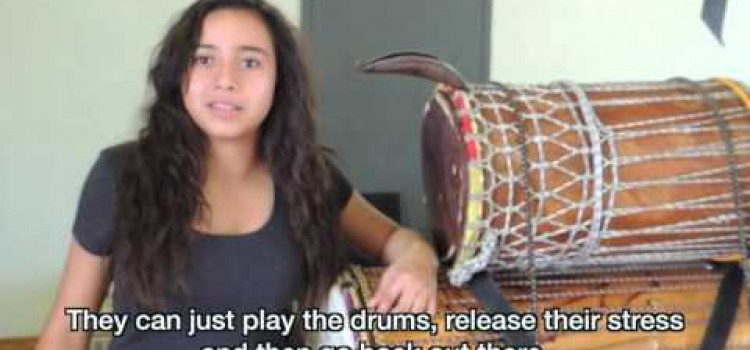

The rhythmic sounds of the chalice-shaped djembe drum come to a halt. April Ramirez’ palms slide down the goat-skinned head of the drum. “Oh man,” says the 15-year-old — she played it wrong.
Ramirez’ teacher is 61 year-old Raymond Quarles, who goes by Yayah. For more than 15 years, Yayah, who is African American, has taught African drumming to at-risk youth at the Homeland Cultural Center in Long Beach as an alternative discipline and diversion program.
“No matter what happens, keep your palms straight, and move forward,” says Yayah after Ramirez plays the wrong beat again. Yayah begins to play alongside her drum.
But for Ramirez, there was a time when moving forward seemed like an impossible feat.
A year earlier she was enrolled at Franklin Classical Middle School in Long Beach. Ramirez planned to graduate with her eighth grade class but trouble at school derailed her plans. For months she had been harassed by another student, and despite pleas to her teachers Ramirez says she got no support.
A confrontation with the student led to Ramirez being given a citation by the school district. She went before a judge at the Long Beach Courthouse and pled guilty to fighting at school. She was sentenced to 30 hours of community service to pay off her $250 citation, an amount that was more than her mother – a single parent – could afford to pay.
The court asked Ramirez to contact The Volunteer Center in Long Beach to match her with a community service program. At the top of the list was West African drumming at Homeland Cultural Center, just around the corner from her home.
Like other diversion programs, the drumming class aims to divert youthful offenders away from the juvenile justice system by providing alternatives to detention. The programs are a resource for first time offenders with minor offenses such as petty theft, fighting at school, or being in possession of drugs or alcohol.
On Saturday mornings for the last four weeks, Ramirez has come to the Homeland Cultural Center to play African drums for eight hours. After unloading the drums, Yayah asks students to take a seat in the chairs he has laid out in a circle.
“I want to make you understand that what you learn here, you can’t learn in school,” Yayah says during class. “We received this information from our brothers and sisters directly from Africa. I am going to share this information with you.”
Yayah’s voice is light-hearted, gentle, and patient. Twenty-five years of learning West African culture – specifically of Mali, Gambia, Senegal, and Guinea – taught Yayah a lot about himself and about his students. He says that when he found African drumming, it “blew his mind.” His philosophy is that students need guidance; they need someone they can look up to. “Mentors are always badly needed,” he insists. “That discipline needs to start at home.”
Yayah constantly mentions the principles of honor and respect in class; to respect the drums and the person who is trying to teach you. In particular, he pushes his students to take pride in other cultures. As they learn rhythms, they learn the name associated with the song, such as Mali’s “Cuckoo” rhythm. This bass to tone slap drum rhythm with an accompaniment of gallops is used to depict the social culture of women’s gossip.
There are those who occasionally fail to comply with the principles of respect. Yayah, often patient but at times stern, removes them from class and sends them back to The Volunteer Center.
His diversion program is one of many in Long Beach that uses art or other creative means to stimulate change and reflection. Another diversion program, Shortstop, uses legal education, mock trials, and parenting classes to keep juvenile offenders between the ages 10 to 17 from reoffending or ending up in jail.
Carolyn Bell, the Executive Director of Shortstop, says nearly three quarters of the youth she serves are Hispanic, while roughly a quarter are African-American. She adds that many of the young people who come through her doors have suffered academically in school or come from a troubled home.
“It’s not about being punitive,” Bell says of the diversion programs. “It’s about the learning process. It’s about keeping you on the right track. To remind you that you are too important to be making these kinds of decisions.”
Much like Bells’ program, Yayah encourages his students to use drumming as an outlet to get off the streets and a channel for their anger, stress, and worries.
“It’s amazing but there are so many other words to describe it,” says Ramirez on her last day of community service. “There is plenty here to be learned and it’s so much better than being out there doing bad things.”
As the class nears its end, Ramirez’s mother, Janet Orellana, thinks her daughter will carry the lessons with her. She has seen a change in her. “She sticks it out, ignores those who hurt her, and focuses on school,” Orellana says.
As Yayah counts Ramirez down they both strike the palms of their hands on the drumhead of their djembe. This time Ramirez says the beat out loud, left, right, left…left, right, left. A smile appears on her face as she watches each of her hands strike with each of her words. She is keeping up with Yayah, she has her palms straight, and she is moving forward− dum duh dumm dah.
